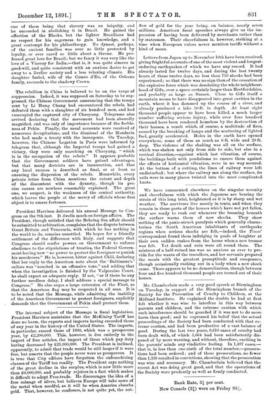The internal subject of the Message is fiscal legislation. President
Harrison maintains that the McKinley Tariff has done no harm, the exports and imports having exceeded those of any year in the history of the United States. The imports, in particular, exceed those of 1890, which was a prosperous year, by £2,200,000. This, however, is due entirely to the import of free articles, the import of those which pay duty baying decreased by £21,000,000. The President is inclined, apparently, to admit that trade would be still larger if it were free, but asserts that the people never were so prosperous. It is true that City editors have forgotten the enfranchising clauses of the Tariff too readily. The President says nothing of the great decline in the surplus, which is now little more than £6,000,000, and probably rejoices in a fast which makes it difficult to adopt Free-trade. He discourages the idea of a free coinage of silver, but believes Europe will take more of the metal when needful, as it will be when America absorbs gold. That, however, he confesses, is not quite yet, the out. flow of gold for the year being, on balance, nearly seven millions. American fiscal speeches always give us the im- pression of having been delivered by merchants rather than by statesmen. Their cheerfulness is, however, striking at a time when European rulers never mention tariffs without a kind of moan.










































 Previous page
Previous page